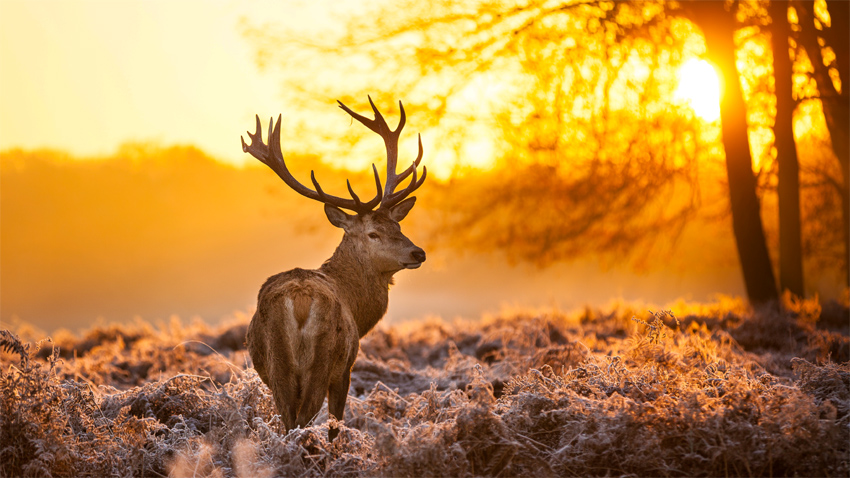An animal shrouded in myth and legend, the deer is accorded a special place in the beliefs and rituals of many nations on different continents. The cult of the deer goes back to the Stone Age and is especially prominent among the peoples of Europe, the Caucuses and Siberia. This is corroborated by archaeological finds - cave drawings, bronze statuettes and portrayals on ancient artifacts. The deer is revered as a totem, as a symbol of the sun or as an assistant to shamans in their travels to the world beyond.
In Bulgarian folklore, the deer has a special place. According to traditional belief he lives high up in unscalable mountain nooks and crannies and drinks water from lakes untouched by humans and inhabited by wood-nymphs and dragons. The deer is the wood-nymphs’ companion with a great many folk songs portraying these beautiful but treacherous creatures, girdled with sashes of rainbow, armed with golden bows and arrows and riding a sur six-winged deer, snakes in hand instead of reins.
The word sur, most often used to describe deer has come down to us from time immemorial and experts are still arguing as to its origin. Sur means “gray” or “albescent” but also “luminous, shining, golden”, nuances connected with Sun symbols. But there are linguists who even find a connection with the Sanskrit word surya which means “sun”. Significantly enough, the word is also attached to other mythical creatures from Bulgarian folklore such as dragons, bears, birds and oxen.
The idea of the deer’s sun symbolism is to be found in Bulgarian carols which frequently describe this remarkable creature:
a bright sun on his forehead,
a bright moon on his chest,
bright stars on his back....
In some songs the newborn Jesus is described as a deer:
The young Jesus was born,
a sur deer; his antlers golden,
his hooves of silver.
It should not be forgotten that Nativity, the time when these songs are traditionally performed, in fact came to take the place of feasts more ancient, connected with the winter solstice, the shortest day of the year and the “birth” of the new sun.

According to some legends, the deer is God’s servant. The Lord would sometimes send angels and saints down to Earth, in the guise of deer. That is why strict bans were in place – that no harm should be done to the sacred animal and it is said that if you were to violate this ban no good would come to you. Still, there is evidence of deer having been sacrificed in the remote past. In many parts of the country a legend is passed down of a deer, who would come down from the mountain on big Christian feasts and offer himself as sacrifice. One time the animal was late and showed up tired and in a sweat but the hungry people didn’t even wait for him to catch his breath and slaughtered him. Since that day he stopped coming down and the peasants started sacrificing bulls or rams.
According to popular belief a man can turn into a deer if God ordains it or by magic, as in the fairytale about the Deer-brother. In the story the boy is transformed into a deer after drinking water from a deer hoof print and later, when immersed in that same water returns to human form. Once people set great store by deer antlers because they were said to have magic powers. And as the animals periodically shed them people would collect them and would display them prominently in their home to ward off evil. According to popular belief drinking shavings from these antlers with water cures evil spells and fright. The monks at Rila Monastery would make medallions out of the deer antlers they found – crucifixes which were very popular among pilgrims who firmly believed in their powers. In this edition of Folk Studio, Ass. Prof. Vihra Baeva, folklore expert at the Bulgarian Academy of Sciences Institute for Ethnology and Folklore Studies with Ethnographic Museum, brings you ancient mythological meanings of the image of the deer in Bulgarian folklore.
Ass. Prof. Vihra Baeva is a folklore expert at the Bulgarian Academy of Sciences Institute for Ethnology and Folklore Studies with Ethnographic Museum.
English version: Milena Daynova
According to popular belief, the color red has the power of the sun and gives vitality to every living being, while white symbolizes purity, innocence and joy . The appearance of the twisted white and red threads, known as martenitsa, means that winter..
The Philip Koutev National School of Folk Arts is not just any school - it is a talent laboratory. It is the first school not only in Bulgaria but in the Balkans for professional study of folklore. It is located in the heart of the beautiful town of..
Scientists from the Sorbonne will study the cultural heritage preserved in the Regional Ethnographic Open-Air Museum "Etar" , informs public broadcaster BNT. In March this year the French scientists together with experts of REOM "Etar" will study elements..

+359 2 9336 661
